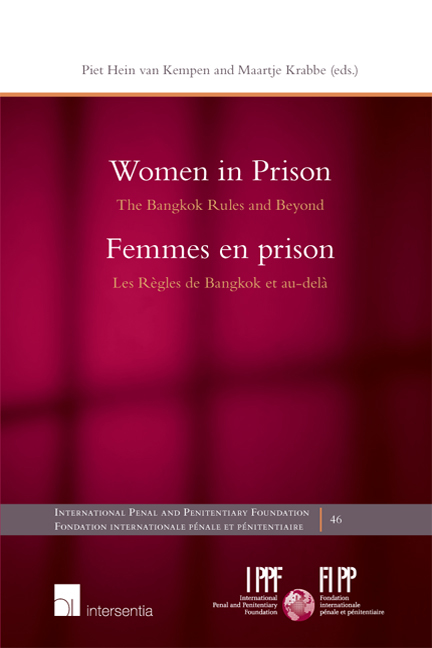Book contents
- Frontmatter
- Foreword
- Avant-propos
- Acknowledgements
- Remerciements
- Contents
- Part I Introductory Synthesis and Analyses: 1ÈRE Partie Synthèse ET Analyses Introductives
- Part II Themes: 2ÈME Partie Thèmes
- Part III National Reports: 3ÈME Partie Rapports Nationaux
- Women in prison in Argentina
- Women in prison in Australia
- Women in prison in Austria
- Women in prison in Brazil
- Women in prison in England and Wales
- Women in prison in Finland
- Femmes en prison en France
- Women in prison in Germany
- Women in prison in Greece
- Women in prison in Ireland
- Femmes en prison en Italie
- Women in prison in the Netherlands
- Women in prison in New Zealand
- Women in prison in Poland
- Women in prison in Portugal
- Women in prison in Russia
- Women in prison in South Africa
- Women in prison in Spain: their criminological and social invisibility
- Femmes en prison en Suisse: la situation des femmes prévenues et condamnées
- Women in prison in Taiwan
- Women in prison in Thailand: implementation of the UN Bangkok Rules in the Thai criminal justice system
- Femmes en prison en Turquie
- Women in prison in the USA
- Appendix The Bangkok Rules: Annexe Règles De Bangkok
- The International Penal and Penitentiary Foundation: History and Purpose
Women in prison in New Zealand
from Part III - National Reports: 3ÈME Partie Rapports Nationaux
Published online by Cambridge University Press: 25 September 2018
- Frontmatter
- Foreword
- Avant-propos
- Acknowledgements
- Remerciements
- Contents
- Part I Introductory Synthesis and Analyses: 1ÈRE Partie Synthèse ET Analyses Introductives
- Part II Themes: 2ÈME Partie Thèmes
- Part III National Reports: 3ÈME Partie Rapports Nationaux
- Women in prison in Argentina
- Women in prison in Australia
- Women in prison in Austria
- Women in prison in Brazil
- Women in prison in England and Wales
- Women in prison in Finland
- Femmes en prison en France
- Women in prison in Germany
- Women in prison in Greece
- Women in prison in Ireland
- Femmes en prison en Italie
- Women in prison in the Netherlands
- Women in prison in New Zealand
- Women in prison in Poland
- Women in prison in Portugal
- Women in prison in Russia
- Women in prison in South Africa
- Women in prison in Spain: their criminological and social invisibility
- Femmes en prison en Suisse: la situation des femmes prévenues et condamnées
- Women in prison in Taiwan
- Women in prison in Thailand: implementation of the UN Bangkok Rules in the Thai criminal justice system
- Femmes en prison en Turquie
- Women in prison in the USA
- Appendix The Bangkok Rules: Annexe Règles De Bangkok
- The International Penal and Penitentiary Foundation: History and Purpose
Summary
INTRODUCTION
As in many other countries, women comprise a small but growing proportion of the prison population. Because New Zealand is geographically a long and narrow country, with many areas that are relatively sparsely populated (especially in the South Island), women are often detained in institutions that are a considerable distance from their normal place of residence. Only small numbers of women are imprisoned, so that they are often housed in relatively small units, sometimes without access to the same range of services and programmes as male inmates. This poses challenges for prison administrators in providing effective rehabilitation and reintegration. Those challenges have not been significantly mitigated by the expansion in the number of women in prison, since the growth is still not at a level that enables the development of programmes that depend upon economies of scale.
This chapter will provide statistics on the number of women apprehended, convicted and imprisoned for offending; the type of offending in which they are involved; the conditions under which they are held when they are imprisoned; and the nature of the rehabilitative and reintegrative programmes and other facilities provided to them within prison.
INTERNATIONAL AND HUMAN RIGHTS FRAMEWORK
INTERNATIONAL HUMAN RIGHTS TREATIES AND CONVENTIONS
New Zealand laws on detention in prison, and on the rights of those who are subject to imprisonment, are governed by a number of international treaties and instruments to which New Zealand is a party. First, New Zealand is a member of the United Nations (UN). It is therefore party to the seven core United Nations human rights instruments. Notably, in relation to detention of women in prison, these include:
- Convention on the Elimination of all Forms of Discrimination against Women (CEDAW);
- Optional Protocol to the CEDAW 1999 (CEDAW-OP);
- Convention Against Torture and other Cruel, Inhuman or Degrading Treatment or Punishment (CAT);
- Optional Protocol to the Convention Against Torture and other Cruel, Inhuman or Degrading Treatment or Punishment 2006 (OPCAT).
All of these international instruments have been ratified without reservation, except in relation to the Tokelau Islands; since Tokelau is a self-governing protectorate, the ratification does not extend to it unless a declaration to that effect is lodged with the UN.
- Type
- Chapter
- Information
- Women in PrisonThe Bangkok Rules and Beyond, pp. 563 - 584Publisher: IntersentiaPrint publication year: 2017



